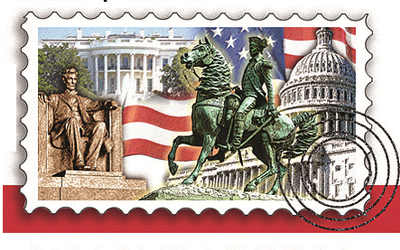LETTER FROM WASHINGTON: Trump’s victories put Republicans in a pickle
by Simon Barber,
2016-03-10 05:58:29.0
CAN the party of Abraham Lincoln survive the nomination of Donald Trump as its presidential candidate? Good question. But then, the Great Emancipator would hardly recognise what his party had become even before Trump started winning primaries.
After Trump’s decisive victories in Mississippi and Michigan on Tuesday, mainstream Republicans have until next week’s winner-take-all contests in Florida and Ohio to find some magic to check his momentum. Unless senator Marco Rubio can beat him in the former and governor John Kasich in the latter, there seems little chance of Trump being denied enough delegates to secure the nomination on the first ballot at the party’s national convention in Cleveland.
Even if the multimillion-dollar blitzkrieg of television ads launched by anti-Trump political action committees has the intended effect, it will still be difficult for any of his remaining rivals to secure a majority by July. Texas Senator Ted Cruz has the best chance but he is only marginally less loathed by governing Republicans than Trump.
Peggy Noonan, who wrote speeches for Ronald Reagan and now writes a column for the Wall Street Journal, sums up her party’s dilemma thus: "If party forces succeed in finagling (Trump) out of the nomination, his supporters will bolt, which will break the party. And it’s hard to see what kind of special sauce, what enduring loyalty, would make them come back in the future. If, on the other hand, Mr Trump is given the crown in Cleveland, party political figures, operatives, loyalists, journalists and intellectuals, not to mention sophisticated suburbanites and, God knows, donors will themselves bolt."
The bulk of Trump’s supporters are voters the party needs to win elections, but who it would otherwise prefer to keep at arm’s length. To Republicans who sincerely revere the memory of Lincoln, and there are a few still, they are an embarrassment. If not on their porches and trucks, then in their hearts, many fly the flag of the pro-slave south whose rebellion Lincoln crushed. It is no mystery why Trump’s largest margin of victory to date came in Mississippi.
The average Trump voter is a white man who would have been a dyed-in-the-wool Democrat before President Lyndon Johnson signed the Civil Rights Act and Voting Right Act in the mid-1960s, sparking a mass exodus from the southern, Dixiecrat wing of the party into the cynically welcoming arms of Richard Nixon’s Republicans.
This voter does not have a degree. Globalisation has done him no favours. Financially, he in is the third or fourth quintile, at or below the national median household income of $50,000 per year, which leaves him, after tax, much less comfortably off than his parents. His pay is stagnant. He does not feel secure in his job, if he has one. That, more than inequality, is what rankles. He does not begrudge Trump his supposed billions, seeing them as a just reward for someone who has made his pile building real things rather than trading derivatives, whatever they are.
He is not anti-big government per se. He is opposed to a government that he believes is favouring minorities, immigrants who are driving down his wages, welfare cheats and people his parents and church have taught him are degenerate. He finds the presence of an African-American in the White House beyond disturbing, proof that the US has been taken over by forces that hold him in contempt. He and his kind have been bleeding for their country in Iraq and Afghanistan, only to come home and find themselves tidied out of sight.
He is a ready customer for what New York Times columnist David Brooks has called "the pornography of pessimism". He loves it that Trump gives him permission to be "politically incorrect", to dismiss the powers in Washington as "idiots" and "babies", and to believe US President Barack Obama is really a Muslim born in Kenya. Trump may have been forced to disavow David Duke and the Ku Klux Klan, but this voter has heard the silent dog whistle and sees the disavowal for what it is. In his eyes, the barrage of media criticism and attack ads only strengthen Trump.
So, where to for the Republicans now that a constituency essential to their electoral maths, but not their sense of political hygiene has anointed a latter-day Caesar as their standard bearer?
In the glow of Tuesday’s triumph, Trump declared himself a great unifier. Only a deeply cynical party could allow itself to be unified under this duce. Which means the Republicans just might let it happen. Lie back and think of Lincoln.
• Barber is a freelance journalist

Letter from Washington
CAN the party of Abraham Lincoln survive the nomination of Donald Trump as its presidential candidate? Good question. But then, the Great Emancipator would hardly recognise what his party had become even before Trump started winning primaries.
After Trump’s decisive victories in Mississippi and Michigan on Tuesday, mainstream Republicans have until next week’s winner-take-all contests in Florida and Ohio to find some magic to check his momentum. Unless senator Marco Rubio can beat him in the former and governor John Kasich in the latter, there seems little chance of Trump being denied enough delegates to secure the nomination on the first ballot at the party’s national convention in Cleveland.
Even if the multimillion-dollar blitzkrieg of television ads launched by anti-Trump political action committees has the intended effect, it will still be difficult for any of his remaining rivals to secure a majority by July. Texas Senator Ted Cruz has the best chance but he is only marginally less loathed by governing Republicans than Trump.
Peggy Noonan, who wrote speeches for Ronald Reagan and now writes a column for the Wall Street Journal, sums up her party’s dilemma thus: "If party forces succeed in finagling (Trump) out of the nomination, his supporters will bolt, which will break the party. And it’s hard to see what kind of special sauce, what enduring loyalty, would make them come back in the future. If, on the other hand, Mr Trump is given the crown in Cleveland, party political figures, operatives, loyalists, journalists and intellectuals, not to mention sophisticated suburbanites and, God knows, donors will themselves bolt."
The bulk of Trump’s supporters are voters the party needs to win elections, but who it would otherwise prefer to keep at arm’s length. To Republicans who sincerely revere the memory of Lincoln, and there are a few still, they are an embarrassment. If not on their porches and trucks, then in their hearts, many fly the flag of the pro-slave south whose rebellion Lincoln crushed. It is no mystery why Trump’s largest margin of victory to date came in Mississippi.
The average Trump voter is a white man who would have been a dyed-in-the-wool Democrat before President Lyndon Johnson signed the Civil Rights Act and Voting Right Act in the mid-1960s, sparking a mass exodus from the southern, Dixiecrat wing of the party into the cynically welcoming arms of Richard Nixon’s Republicans.
This voter does not have a degree. Globalisation has done him no favours. Financially, he in is the third or fourth quintile, at or below the national median household income of $50,000 per year, which leaves him, after tax, much less comfortably off than his parents. His pay is stagnant. He does not feel secure in his job, if he has one. That, more than inequality, is what rankles. He does not begrudge Trump his supposed billions, seeing them as a just reward for someone who has made his pile building real things rather than trading derivatives, whatever they are.
He is not anti-big government per se. He is opposed to a government that he believes is favouring minorities, immigrants who are driving down his wages, welfare cheats and people his parents and church have taught him are degenerate. He finds the presence of an African-American in the White House beyond disturbing, proof that the US has been taken over by forces that hold him in contempt. He and his kind have been bleeding for their country in Iraq and Afghanistan, only to come home and find themselves tidied out of sight.
He is a ready customer for what New York Times columnist David Brooks has called "the pornography of pessimism". He loves it that Trump gives him permission to be "politically incorrect", to dismiss the powers in Washington as "idiots" and "babies", and to believe US President Barack Obama is really a Muslim born in Kenya. Trump may have been forced to disavow David Duke and the Ku Klux Klan, but this voter has heard the silent dog whistle and sees the disavowal for what it is. In his eyes, the barrage of media criticism and attack ads only strengthen Trump.
So, where to for the Republicans now that a constituency essential to their electoral maths, but not their sense of political hygiene has anointed a latter-day Caesar as their standard bearer?
In the glow of Tuesday’s triumph, Trump declared himself a great unifier. Only a deeply cynical party could allow itself to be unified under this duce. Which means the Republicans just might let it happen. Lie back and think of Lincoln.
• Barber is a freelance journalist




















Change: 0.40%
Change: 0.47%
Change: -0.49%
Change: 0.53%
Change: 1.03%
Data supplied by Profile Data
Change: 1.71%
Change: 1.28%
Change: 0.40%
Change: 0.00%
Change: 1.64%
Data supplied by Profile Data
Change: -1.27%
Change: 0.00%
Change: 0.05%
Change: -0.08%
Change: 0.35%
Data supplied by Profile Data
Change: -0.02%
Change: 0.21%
Change: -0.06%
Change: 0.53%
Change: 0.70%
Data supplied by Profile Data